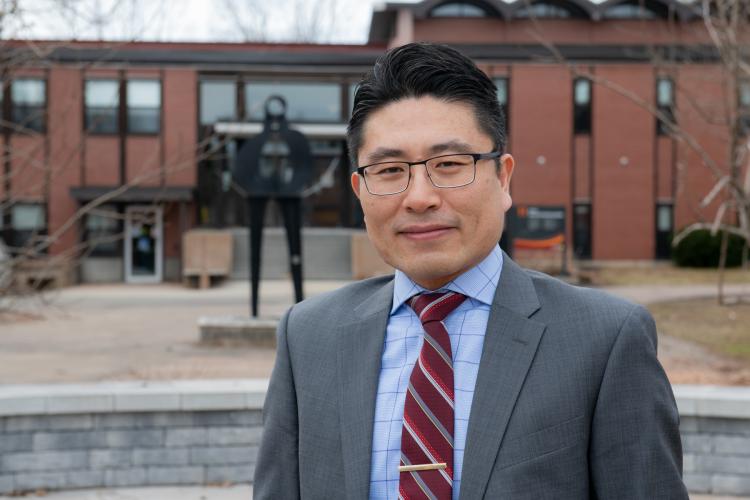
Dr. Xander Wang, an associate professor with the UPEI School of Climate Change and Adaptation, has been awarded $1.65 million from the Natural Sciences and Engineering Research Council of Canada (NSERC)'s Collaborative Research and Training Experience (CREATE) program for a project called "NSERC CREATE Training Network for CLImate Smart Agriculture (CLISA)."
On May 16, NSERC issued a news release announcing $26 million in funding through its 2024 CREATE program for 16 training programs, including Dr. Wang's project. It will "facilitate the transition of new researchers from trainees to productive employees in the Canadian workforce while tackling crucial science and engineering challenges."
Through the CLISA project, a network of researchers, new graduates, and professionals with knowledge and expertise in climate smart agriculture will be trained to promote the development and application of new technologies and strategies in Canadian farming practices and strengthen the country's agricultural workforce. The project aims to reduce the impact of climate change on the agriculture industry and food security.
"Climate change is already having a significant impact on agriculture and food security due to increased prevalence of extreme events and increased unpredictability of weather patterns," said Dr. Wang. "This is especially true for Canadian farmers who have seen increases in heat and drought in many agricultural regions, including the Maritimes, the Prairies, and southern Ontario. Future climate projections show that Canadians will likely see drier summers from coast to coast but increased winter and spring precipitation. While some aspects of climate change may be promising for example, longer frost-free seasons the unexpected increase in climate variability and more frequent extreme events will adversely affect the agricultural industry."
Dr. Wang said that agriculture is a significant contributor to global warming, with about ten per cent of Canada's greenhouse gas emissions (GHG) coming from crop and livestock production.
"Enhancing food security while reducing agricultural GHG emissions and preserving the natural resource base and vital ecosystem services requires a significant transition to more productive, sustainable, and resilient agricultural production systems."
Such a transition demands a major shift in the way that land, water, and soil nutrients are managed to ensure that these resources are used more efficiently, he said. Making this change requires considerable changes in the traditional farming technologies and practices a transition that will rely heavily on new graduates, researchers, and professionals who have knowledge and expertise in climate smart agriculture.
The CLISA network aims to address the need for these highly trained personnel by advancing cutting-edge research and development of new methods for precision agriculture, water and soil management, sustainable food production and food value chains, and climate-smart financing and policies.
Dr. Wang will lead the development of CLISA with collaborators at Memorial University, Dalhousie University, the University of Saskatchewan, Lethbridge College, the University of British Columbia, and the University of Guelph.
"Climate change is one of the greatest challenges facing our country and indeed our planet, and the threat of food insecurity is a very real part of it," said Dr. Greg Keefe, Interim President and Vice-Chancellor of UPEI. "With our climate change and adaptation program, UPEI is uniquely placed to explore solutions that will help our agriculture industry meet the needs of Canadians in years to come. I congratulate Dr. Wang on achieving the funding for this important project."
Dr. Greg Naterer, Vice-President Academic and Research at UPEI, also congratulated Wang on receiving the NSERC CREATE funding.
"Dr. Wang's project is an excellent example of the impactful research and scholarly work at UPEI that is addressing global challenges," he said. "His success in the CREATE program builds upon the University's national recognition of excellence in research."











